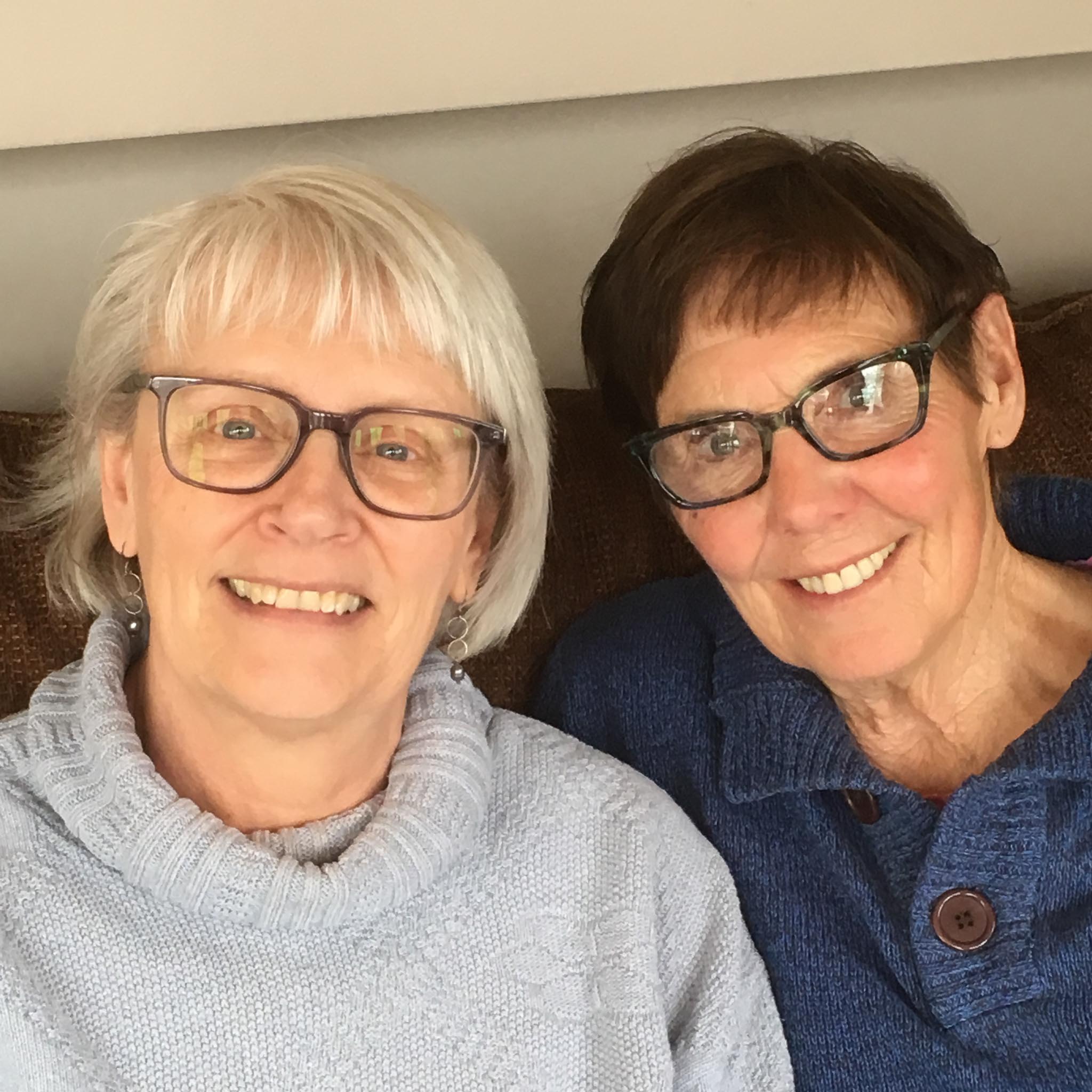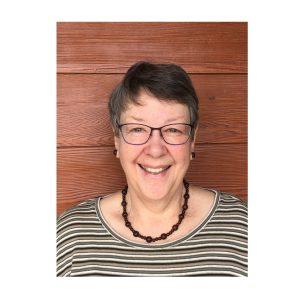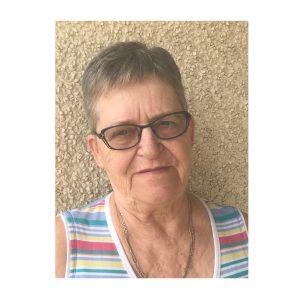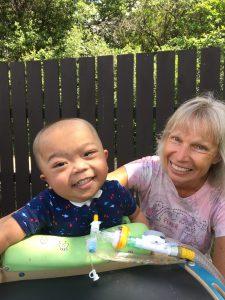For two strangers, it was the garden that brought them together. And once the seed was planted, it was a special friendship that blossomed.
* * *
Joan had been a stay-at-home mom for much of her adult life. In 2004, as she approached 50, her youngest daughter was heading into high school. “And that was going to be the time when I was going to have ‘me’ time,” says Joan. “Maybe go back to school, get some education. But,” she says, “the good Lord had other plans.” It was then that Joan was diagnosed with breast cancer. Despite going through a difficult course of chemotherapy, the cancer metastasized to her bones. “I did five palliative radiation treatments, and in 2005 did six more chemo treatments, plus herceptin – which was then in clinical trial stage. The lifespan for breast cancer that’s gone to the bone, metastatically, is still two and a half years. But because of medications like herceptin, there are some of us who are living with it a longer time. This is really uncharted territory though; they don’t know how long to keep us on the medication.” While the medication therapy strengthened her bones, she says, it also made them very brittle.
Ten years later, Joan had far outlived her initial prognosis. However, her fragile bones were prone to breaking; plus osteoarthritis and osteoporosis had taken their toll. “I have lots of bone issues,” she says, then smiles gently: “I’m like a delicate teacup.” She could no longer get out into her backyard to plant and tend her bountiful vegetable and flower garden. “I love gardening,” says Joan, “and I still had the brain to do it, but I needed the braun.” It was in her Bosom Buddies cancer survivors support group that she heard of the Prairie Hospice Society (PHS), and that they could provide volunteer help for someone in her exact situation.
In 2014 Joan was matched with PHS volunteer Moira Remmen, a woman whose lifelong passion was horses, but who knew her way around gardens and kitchens from years on the farm. At 69, she’d mostly retired from her career as a psychometrist in clinical health psychology at Royal University Hospital. The two women decided on Tuesday as their day together; Joan thought it was a bonus that Moira could even drive her to her support group meeting every third Tuesday at the Cancer Lodge.
That was five years ago. Today Joan and Moira count each other as cherished friends. Moira has gotten to know Joan’s husband and three grown children; even her grandchildren. Sitting in Joan’s living room, with blue jays at the feeder outside the window, the two women talk about their partnership.
“We always have a little debrief at the beginning of our visit,” says Moira, “how our week has been, what we’ve been doing … then we do errands and have tea.” Together they’ve made Easter bread, prepared for family meals, gardened. Moira will help Joan with her pie crusts as she no longer has the strength to roll out the pastry.
“We’ve grown over the years,” says Joan. “I mean, Moira was a stranger when we first met. She’s certainly not a stranger now – I really think of her as a close friend. I know that I can ask her anything … she’s such a willing helper. Sometimes I’ll just say ‘Moira, can you vacuum?’ and she’ll do that. Or I won’t have the strength to make my bed so she’ll help me make my bed.” Joan and Moira agree that, while Joan has many other friends who are all very helpful, this relationship is a bit different; almost more familial, like a sister. “I guess because I know that Moira has chosen to be involved with Prairie Hospice,” says Joan, “because she has very graciously chosen to be here … I just feel more at ease to ask her about certain things.”
“Of course!” says Moira. “And I’m happy to help in any way.” With a grin, she adds, “But sometimes I mess up!” Both women break into laughter, then Moira tells a story of the time she accidentally vacuumed up one of Joan’s earrings in her bedroom. “Her husband Dave had to fish it out of the bottom of the central vac canister when he got home from work that day,” she recounts, chuckling. “We laugh about these things.” And there was a comedy of errors when the two women drove to City Hall to renew the handicapped sticker for Joan’s vehicle which has become a funny anecdote in their friendship.
“We spend a lot of time together,” says Moira. “We confide in one another, we’ve become good friends. Sometimes we go for a country drive, and she comes out to my place. We text a lot too, several times a week, just to check in with each other.”
Joan says she is able to talk to Moira about things she’s not able to say to her family. She says she was just reflecting last week with her youngest daughter who was 14 at the time her mother was diagnosed. Joan says she didn’t share every detail with her daughter back then because she felt it wasn’t age-appropriate. “But I can share things with Moira without overburdening her,” says Joan. “And she brings a different perspective too.”
Moira agrees. “Often family aren’t comfortable talking about death, or arrangements afterwards – that’s pretty common. Joan and I can talk about things that her family might not.”
While the two women have different lives and passions, one thing they share is a strong Christian faith. “We’ve talked about our faith quite a lot, haven’t we?” says Moira to Joan. “And I’ve learned a lot about Joan’s Christian Orthodox church. I’ve been to her church and met her priest. Sometimes we’ll dust together; Joan’s got a lot of icons of saints, and I get the history and the stories as we dust. I think that takes us to a new level of closeness, to share our faith.”
Asked what they’ve learned from each other, Joan says that through Moira she’s discovered a lot about horses. Now 74 years old, Moira rides outdoors pretty much every day of the year. With 80 acres and 8 horses, chores alone take her three hours each day. Moira has also entertained Joan’s children and grandchildren out at her place. “We had a little horse excursion,” smiles Moira. “The kids had a ride.”
Moira says she’s gained a lot of knowledge about gardening. “Joan is a master gardener! And I’ve learned about ‘Sun Tea’,” she says, explaining that in summers, Joan puts loose tea leaves in a clear glass jug with water and lets them steep in the sun. “Then you add ice. It goes really fast because everyone loves it.”
Gazing at Joan thoughtfully, Moira adds: “And I’ve learned valuable lessons from Joan about living with cancer. If I ever have to embark on that journey I hope to deal with it as she does, treasuring each day. She is very wise in the way that she manages her health issues.”
Joan smiles at her friend appreciatively. “When you’ve been given a death sentence,” she says, “you know the whole cancer journey, it gives you a totally different perspective of life. And I hope people see that I really do try to treasure the moments. When it went metastatic, I told the oncologist, ‘I have to see my daughter graduate from Grade 12.’ Now I’ve seen all my kids graduate from Grade 12, I’ve seen them all get married, all graduate from their choice of post-secondary education, and I have 10 grandchildren with another two on the way. So it’s just incredible. I try to live in the moment.”
Joan beams at Moira. “And throughout it, Moira is my angel – my helper.”
Moira beams back at her: “We’re an awesome team!”
* * *
Joan’s Sun Tea:
Fill a glass gallon jar – ideally one with a spigot – with water. Add six teabags – one must be peppermint, but the others can be any mixture of herbal or black teas. Set the jar in the sun, and let the bags steep for at least two hours or until it looks richly coloured. Add 3/4 cup of honey and 1/4 cup of lemon juice. Serve over ice.




